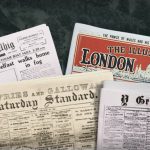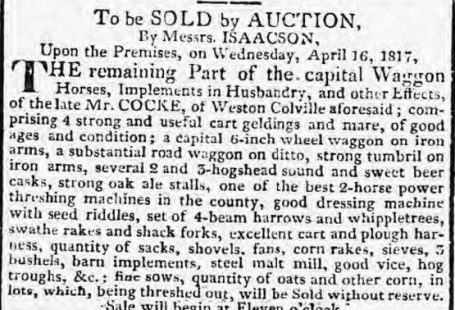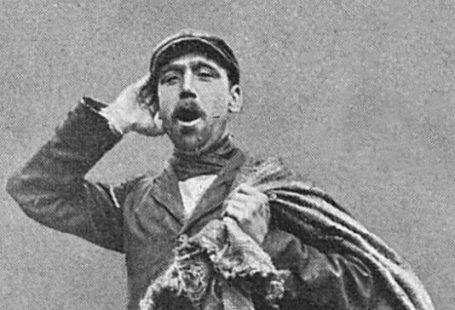This week at The Archive is a particularly special one. Not only have we added 156,724 brand new pages, we are also delighted to announce the extension of our long-term partnership with the British Library. Having already worked together for over ten years, and so far digitised 42 million pages together, we look forward to bringing many more newspaper pages to our digital collection. You can find out more about the extension of our partnership here.
Register now and explore the Archive
Our additions this week include ‘A Summary of European, British, Colonial and American News for the Far East,’ as well as four new Scottish publications. Read on to discover more about this week’s new and updated titles, as well as to find out more about the work of the Chinese Labour Corps, which was undertaken during the course of the First World War.
Our first new title of the week is the London and China Express. First published on 25 November 1858 in London as the China Express, this title was ‘Specially Adapted for Readers in Ceylon [Sri Lanka], China, Japan and Other Eastern Settlements.’ Published in time for dispatch via the Marseilles mails, ‘on the 9th and 25th of each month, or on the following days,’ the first edition of the London and China Express lays out its prospectus:
The want of a Newspaper fully chronicling events in this country in connection with China, and the countries beyond India, having been suggested, it is determined to publish a paper which shall be more exclusively devoted to the commercial intelligence of that part of the world.
London and China Express | 26 April 1859
It continues:
The present publications for the East, regarding almost entirely the requirements of those residing in the Indian Empire, and being published weekly, whilst the mails to and from China, Japan, Manila, Siam [Thailand], Borneo, Java, Singapore, and Penang, are bi-monthly, present a disjointed compilation of events, which are conceived to be objectionable. In those papers there is an absence of local knowledge of the wants of the residents of those far Eastern parts, which the promoters of the China Express hope to supply.
Therefore, the London and China Express hoped to communicate news from Britain to China, and other countries of the Far East, with special emphasis on those areas. For example, the Commercial Department of the newspaper ‘will be superintended by a gentleman who has for many years resided in China.’
London and China Express | 19 January 1900
But what else could you expect to find within the pages of the London and China Express? There would be sections devoted to ‘Literature, Drama and the Fine Arts,’ whilst the ‘general reader will have laid before him a judicious compilation of Legal, Naval and Military Intelligence, and the general news of the fortnight.’
You could also find within its pages lists of passengers traveling to China and elsewhere, ‘Home Intelligence’ from Britain, as well as ‘Provincial Intelligence’ from such cities as Manchester, Leeds and Bradford. ‘Foreign Intelligence’ could be found too, coming from the Netherlands, Italy, Russia, France, Spain, Turkey, the United States, Mexico and Chile. Meanwhile, the London and China Express featured notices of births, marriages and deaths, as well as the latest shipping intelligence.
London and China Express | 12 January 1900
By 1900 the newspaper was appearing every Friday at the cost of 9d and consisting of 32 pages; and in 1922 it changed its name to the China Express and Telegraph.
We move now to Scotland for our next new titles, and begin with the Weekly Free Press and Aberdeen Herald. A historic title, the Aberdeen Herald was founded in 1806 before it was eventually taken over by the owners of the Free Press, forming the Weekly Free Press and Aberdeen Herald. Published every Saturday and costing one penny, this title circulated throughout the county of Aberdeenshire, reaching 3,000 households.
Weekly Free Pres and Aberdeen Herald | 17 May 1890
Liberal in its politics, the Weekly Free Press and Aberdeen Herald featured poetry, serialized novels, like The Bertram Baronetcy by George Barnett Smith, as well as other literary extracts. You can also find within its pages a rich variety of news from the area – with features on ‘Social Gatherings’ and the ‘Aberdeen Dog Show,’ as well as notices of births, marriages and deaths.
Our next new title of the week is the Saturday Inverness Advertiser. The Saturday edition of the Inverness Advertiser and Ross-shire Chronicle, it was first published on 11 February 1860 and cost one penny. It last appeared on 16 September 1882, when the Inverness Advertiser was purchased by the proprietors of rival newspaper the Inverness Courier.
Next up is the Kirriemuir Observer and General Advertiser. First published in the Angus burgh of Kirriemuir in 1869, this independent publication was founded by W.B. Mills. Indeed, the Kirriemuir Observer was known as Mills’s ‘Magnus Opus,’ its pages being ‘a perfect treasury of articles bearing on the lore of a district peculiarly rich in narrative.’
An ‘unqualified success’ from the start, like its rival the Kirriemuir Free Press and Angus Advertiser, it appeared gratis. Giving ‘encouragement to every laudable effort for the budding genius of the locality,’ the Kirriemuir Observer included ‘literature and poetry…for its own sake,’ offering ‘spicy and clean humour’ to its readers.
Kirriemuir Observer and General Advertiser | 23 April 1915
And one of the Kirriemuir Observer’s particularly special readers was none other than Peter Pan author J.M. Barrie, who once said of the publication: ‘There was a time when it was not merely my favourite, but my only newspaper.’
In 1917 the Kirriemuir Observer increased in size, for the first time incurring a cost of one halfpenny. However, Kirriemuir will long be remembered as a ‘distinguished…seat of gratis newspapers.’
Rounding off our new titles this week is the Teviotdale Record and Jedburgh Advertiser. Published in Jedburgh, the historic county town of Roxburghshire and former royal burgh situated in the Scottish borders, this newspaper appeared every Saturday. Teviotdale is a traditional province which is closely equivalent to Roxburghshire.
First published on 31 July 1855 at the cost of one penny, the Teviotdale Record was rich in local news, containing, for example, the latest on the Jedburgh Border Games. The newspaper also featured original poetry, as well as ‘Hints on Flowers’ for the gardeners amongst its readership. Within its pages you could also find marriages and deaths notices, ‘War Intelligence’ and other ‘Local Intelligence.’
Teviotdale Record and Jedburgh Advertiser | 14 August 1855
In 1857 the Teviotdale Record and Jedburgh Advertiser was enlarged, moving from a Tuesday publication to a Saturday one, and now costing three halfpence. It promised to render itself ‘as popular as possible, in District News, Parliamentary Intelligence, Literary Notices, Markets, &c.’
That may be it for our new titles of the week – but we have not neglected our existing ones! We have added over 50,000 pages to the West Briton and Cornwall Advertiser, spanning over 30 years from 1951 to 1982. Other highlights include the addition of new pages to the Halifax Comet and Liverpool’s Northern Daily Times.
Commemorating the Work of the Chinese Labour Corps
On 14 August 1917 China declared war on the Central Powers of Germany and Austro-Hungary, Sir Charles Addis noting some years later in the London and China Express, 22 May 1919, how it was a ‘memorable day in the history of the war,’ for:
Her act in entering the war was one of profound significance, especially when it was remembered that this Oriental nation is separated from the scene of warfare by ten thousand miles of ocean, that their shores were unmenaced and her political institutions in no danger.
But China already had some involvement in the First World War, supplying labourers to the Western Front to work for the British and French Armies from 1916. And although China never sent soldiers to the front, these men, of which there were 140,000 and who formed the Chinese Labour Corps, did invaluable work, labouring close to enemy lines.
The Chinese Labour Corps on the Western Front | Illustrated War News | 6 March 1918
The London and China Express sheds light on the work of the Chinese Labour Corps, or the CLC as they were known. Please do be advised that some of the terminology used is outmoded, and would not be used by us today. The London and China Express reports in April 1919 how the CLC:
…relieved our own men from an enormous amount of heavy and miscellaneous work behind the lines, and so helped to release a much larger proportion than otherwise would have been possible for combatant duties. For not only did the Chinese fulfil multifarious tasks at the various bases, such as loading and unloading ships and trains, building railways, repairing roads, working in petrol factories and at various supply depots throughout the northern region, but they dug hundreds of support trenches in the forward areas, well within shell range. Although I have seen no figures on the subject, I know that a fair number of Chinese have been killed and wounded by enemy action since they went to France.
It is thought that some 2,000 members of the Chinese Labour Corps died whilst in France, many as a result of the Spanish flu pandemic. 39 members of the CLC were buried at Noyelles-sur-Mer, the CLC’s base in France, with other memorials located in the United Kingdom, Canada and Belgium.
Members of the CLC at work | Illustrated War News | 6 March 1918
The ‘vast majority‘ of the CLC were recruited from Shantung Province, under a term of engagement of three years. They could expect to receive pay of ‘a franc a day with food and clothing in France, and a bonus of 10 Mexican dollars to…family in China.’ And even when the war ended, the CLC’s work was not over.
A correspondent writing to the London and China Express in August 1919 details how:
Many are probably not aware of the enormous amount of salvage, representing national wealth, which is daily rescued and sorted by the numerous Chinese companies all over the battlefields. The work is being very ably carried out, and the returns consistently show how important it is financially that this work should continue.
Members of the CLC demonstrate ‘sword fighting’ | Illustrated War News | 13 March 1918
The CLC were engaged in salvage work in the months after the war came to an end, and meanwhile, throughout the conflict and this time, they shared aspects of their culture with the British and French troops.
An ’eminent missionary,’ writing for the British Weekly, is quoted in the London and China Express in January 1919, telling of King George V’s encounter with the CLC in France:
One day we met the King, who came to visit one of the companies. They erected a red Chinese triumphal arch in his honour. Chinese mottos, about the dawn of peace and the virtues of the King and his Ministers emblazoned the walls, and flags fluttered everywhere. They shouted a Chinese welcome when his Majesty came, and sent him off with a cheer like the sound of many waters. The King seemed highly pleased, and the Chinese of course, were much elated.
A member of the CLC celebrates Chinese New Year at his hut | Illustrated War News | 20 March 1918
Meanwhile, Chinese New Year on 11 February 1919 was ‘joyously celebrated:’
Among so many men could be found a number of professional actors, acrobats, and story-tellers, who were only too pleased to exhibit their skill. A procession headed by the camp ‘band’ was formed.
However, by the end of 1919 the CLC were beginning to outstay their welcome, at least in the minds of their French hosts. The London and China Express in December 1919 quotes M. Bulos, the Sub-Prefect of Boulogne and the head of the French civil administration as saying ‘We want to get rid of the Chinese, and the sooner the better.’
Celebrating Chinese New Year | Illustrated War News | 20 March 1918
The writer for the London and China Express is quick to condemn such an attitude, remarking on the ‘ingratitude’ in evidence, and how the CLC ‘have undoubtedly performed great services behind the lines.’
There may too have been something else at play, with racism sadly playing its part. A report of October 1919 relates how 500 members of the CLC were being repatriated per day, and how:
…it is of interest to note that in view of the ever-increasing number of marriages between French women and Chinese labourers, M. Pams, Minister of the Interior, has addressed a circular to the various Prefects in which he issues a warning against such unions.
It seems, therefore, that the French government had concern over such marriages, and wanted their Chinese visitors gone, despite the good work they had done.
British soldiers teach members of the CLC boxing | Illustrated War News | 13 March 1918
But others were vociferous in their praise of the CLC, including the ’eminent missionary’ who was writing for the British Weekly. He remarks how:
It is not sufficiently realised at home…what good service the 100,000 Chinese recruits have done during the war. Their officers are loud in their praise.
And we too shall take a moment in this blog to commemorate the often forgotten work of the Chinese Labour Corps, the hard work and sacrifice undertaken by these young men far from home, some of whom paid the ultimate price.
New Titles
Title |
Years Added |
| Kirriemuir Observer and General Advertiser | 1884-1885, 1915-1949 |
| London and China Express | 1858-1861, 1863-1905, 1907-1919, 1923-1931 |
| Saturday Inverness Advertiser | 1860-1879, 1881-1882 |
| Teviotdale Record and Jedburgh Advertiser | 1855-1872, 1874-1878, 1881, 1885-1910 |
| Weekly Free Press and Aberdeen Herald | 1879-1881, 1883-1884, 1887-1888, 1890, 1892 |
Updated Titles
This week we have updated eight of our existing titles.
You can learn more about each of the titles we add to every week by clicking on their names. On each paper’s title page, you can read a FREE sample issue, learn more about our current holdings, and our plans for digitisation.
Title |
Years Added |
| Blackpool Gazette & Herald | 1894 |
| Glasgow Weekly Mail | 1869 |
| Halifax Comet | 1896-1897 |
| Liverpool Standard and General Commercial Advertiser | 1837 |
| Northern Daily Times | 1855 |
| Sun (London) | 1843 |
| Weekly Journal (Hartlepool) | 1905-1906, 1909 |
| West Briton and Cornwall Advertiser | 1965-1982 |
You can keep up to date with all the latest additions by visiting the recently added page. You can even look ahead to see what we’re going to add tomorrow.


















